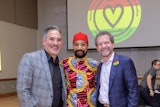Dr. Alondra Nelson, an associate professor of sociology at Columbia University, didn’t set out to find stethoscopes and the white coats of medicine among stories of gun-toting Black Panther Party members or their iconic black leather jackets and berets, but she did.
The historical research and extensive interviews conducted with members of the Black Panther Party that eventually led to Nelson’s October 2011 book, Body and Soul: The Black Panther Party and the Fight Against Medical Discrimination, began, somewhat, as a scholarly detour and personal curiosity. Nelson, whose expertise includes gender, science, and socio-historical studies of medicine, had already set out to understand and write about the barriers that African-American communities confronted in mobilizing around the HIV/AIDS epidemic when she began noticing references to the Panther’s little-known health activism.
Nelson, who wasn’t born when Bobby Seal and Huey P. Newton founded the party in October 1966, says photographs of Panther Party member Kathleen Cleaver’s fierce afro and sunglass-covered eyes are among her first images of the Black Panthers, but as a scholar, she had only “a passing knowledge of the Black Panther Party’s health-related activities.” Delving deeper, Nelson writes about the group’s understanding of health as a basic human right and the social implications of genetics that, decades ago, seemed to anticipate the current debates about the politics of health and race. Nelson says there are many lessons to be learned from the Panther Party’s health care campaign and education platform on sickle cell disease.
DI: What inspired you to tackle the topic of the Black Panthers’ health activism?
AN: I didn’t come to the book intending to be a Panther scholar. I try to impress upon people that there is so much of their history that we don’t know, and that some of the things that first come to mind about the Black Panther Party are true. The book is not meant to say that they were angels but that their history is complicated. The fact that we don’t know about their health politics suggests that we may have all been a little hoodwinked by the way that the media framed the Black Panther Party during this period.
DI: Are there parallels between the Black Panthers’ response to sickle cell disease and the type of health activism needed today for HIV/AIDS in the Black community?
AN: What the Black Panthers were really good at was putting sickle cell in the context of Black history and Black struggle, which made sense for people. They were able to say that this disease is something that is related to the history of slavery and the transportation of slaves from places in Western Africa. They understood that sickle cell anemia was an adaptive disease and actually a useful thing in West Africa [in fighting malaria]. The Panthers were able to explain why the disease existed, showing that Black health care had been neglected, and were able to change what it meant for sickle cell anemia to be a Black disease, instead of it being a stigmatizing disease that disproportionately impacted Black people.
Similarly, this approach may be useful in thinking about HIV/AIDS, placing what we need to do about HIV/AIDS in the context of the long history of Black communities mobilizing around health activism.
DI: What did you learn about the health clinics and centers that the Panthers developed?
AN: They were a part of a national network of clinics at 13 different sites. There were about 15 or 16; some communities had more than one. The clinics were a mandatory part of being a Black Panther chapter by 1970. The local chapters had to do all the work of providing resources to get the clinics started. The spectrum goes from success to utter failure in the way that they [clinics] were established. The clinics were mostly modest efforts, staffed by members of the Black Panther Party. Local people in the community could be involved in providing health care. Members of the party taught them how to do things like take blood pressure and do basic triage.
DI: Is it true that these health clinics were also one-stop centers for other social services the community needed?
AN: Yes. They had a role called the patient advocate. They believed that the health clinics were only one part of what made people healthy, helped them flourish and have well-being. Patient advocates would help people get access to food or help them deal with a difficult landlord. If they needed pest control in their apartment, jobs, they tried to help them get it.















